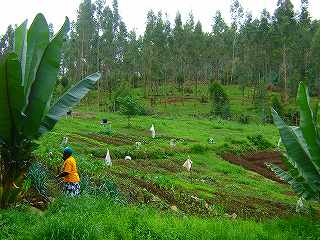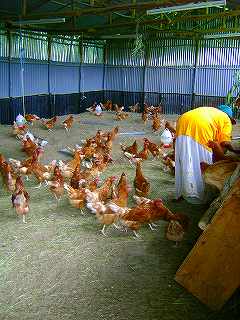| |
An inauguration ceremony for a project for supporting a women’s association in Yeka Sub-City, Addis Ababa, will take place on 23 July, 2011. The project was funded by the Japanese Government through its Grant Assistance for Grassroots Human Security Projects (GGP) scheme with USD 82,826, and implemented by a local NGO named Bio-economy Association (BA). H.E. Mr. Hiroyuki Kishino, Ambassador of Japan to Ethiopia, celebrated the completion of the project, together with Dr. Selamawit Assefa, Executive Director of the BA, local government representatives of the Yeka Sub-City, as well as members of the community.
This project was approved based on the “Cool Earth Partnership”, which is a new concept established by the Government of Japan to cooperate actively with developing countries' efforts to reduce emissions and to enhance energy efficiency. The target group of the project is a group of women who used to work as fuel wood collectors and carriers in Yeka Sub City in Addis Ababa. Having realized that their activity affected both the degradation of forests and their own health condition, the BA proposed an innovative project to alleviate these problems by using a Bio-farm System, an integrated, nature-based resource management approach.
 |
For this project, 400 poor and underprivileged female wood collectors and carriers were selected by the Yeka Sub-City Kebele 03 and 04 Women’s Association and were given integrated bio-farm training, such as composting, bio-recycling, biogas energy and livestock waste management. The trained women acquired practical knowledge and skills and adopted and implemented those bio-farming techniques and now produce organic vegetable in their bio-farm in Yeka Sub-City.
 By using biogas instead of wood as an alternative fuel resource they are contributing to deforestation control and are able to shift their livelihood from fuel wood collection activity to diversified income generating activities, especially farm production. By using biogas instead of wood as an alternative fuel resource they are contributing to deforestation control and are able to shift their livelihood from fuel wood collection activity to diversified income generating activities, especially farm production.
H.E. Mr. Hiroyuki Kishino, in his speech at the inauguration ceremony, expressed his appreciation to the people in the Women’s Association as well as the BA for their deep devotion to the completion of the project. He also expressed his gratitude that the project has changed the livelihood of so many women for the better in many ways. For instance, by consuming organic vegetables, their dietary and health status has been remarkably improved, and by gaining income, their children are able to attend school regularly because their mothers can now afford the educational expenses. In addition, he stressed that this project has contributed to the efficient use of natural resources, protection of the environment and restoration of the ecosystem in Yeka Sub-City. Ultimately, the Ambassador said, this project will serve as a demonstration and model to promote eco-friendly technology among other communities in Ethiopia.
Since 1997, the Embassy of Japan in Ethiopia has supported over 287 Grassroots Human Security Projects throughout Ethiopia, in education, water, agriculture, health and other areas of basic human needs. The Government of Japan will continue to support a variety of projects at the grassroots level for marginalized and vulnerable people.
|
|



